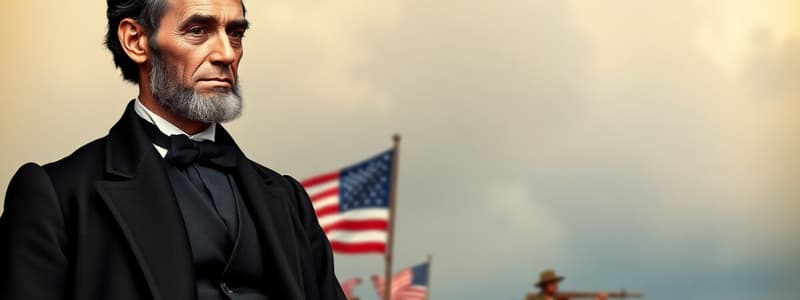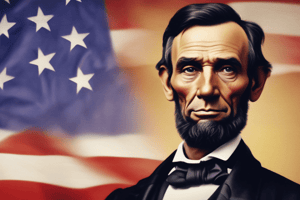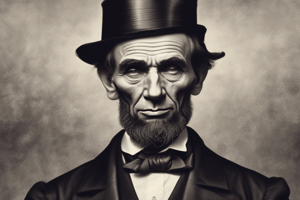Podcast
Questions and Answers
What was the main strategic reason behind the Union's policy of shielding escaped enslaved people who reached Union lines?
What was the main strategic reason behind the Union's policy of shielding escaped enslaved people who reached Union lines?
- To deplete the Confederacy's labor force, thereby weakening their war effort. (correct)
- To comply with international pressures advocating for the abolishment of slavery.
- To provide humanitarian aid and refuge to all enslaved people seeking freedom.
- To integrate them immediately into the Union army, bolstering their troop numbers.
How did the Confiscation Act of 1862 expand upon the initial Confiscation Act of 1861?
How did the Confiscation Act of 1862 expand upon the initial Confiscation Act of 1861?
- It authorized the Union to seize only land and financial assets from the Confederacy.
- It provided monetary compensation to slaveholders who voluntarily freed their slaves.
- It broadened freedom to include escaped enslaved people and those taken into custody by the Union army. (correct)
- It mandated the immediate emancipation of all enslaved people in the United States.
Why did Lincoln's initial plans for the colonization of formerly enslaved people fail to gain traction?
Why did Lincoln's initial plans for the colonization of formerly enslaved people fail to gain traction?
- The proposed locations for the colonies were deemed unsuitable due to climate and resources.
- Neither Black leaders nor abolitionists supported the idea of sending formerly enslaved people to colonies. (correct)
- The financial burden of establishing colonies proved to be insurmountable for the Union government.
- European powers actively undermined the establishment of American colonies in Africa and Central America.
What condition did Lincoln attach to his ultimatum to the Confederate states regarding slavery?
What condition did Lincoln attach to his ultimatum to the Confederate states regarding slavery?
What was the significance of Congress banning slavery in the territories in July 1862?
What was the significance of Congress banning slavery in the territories in July 1862?
What was a significant reason why the Confederacy believed Great Britain would ally with them during the Civil War?
What was a significant reason why the Confederacy believed Great Britain would ally with them during the Civil War?
What was the ultimate impact of the Emancipation Proclamation on Great Britain's view of the Civil War?
What was the ultimate impact of the Emancipation Proclamation on Great Britain's view of the Civil War?
Prior to the Emancipation Proclamation, how were escaped enslaved people primarily utilized by Union forces in 1861 and 1862?
Prior to the Emancipation Proclamation, how were escaped enslaved people primarily utilized by Union forces in 1861 and 1862?
Despite their contributions to the Union Army, what discriminatory practice did African American soldiers face compared to their White counterparts?
Despite their contributions to the Union Army, what discriminatory practice did African American soldiers face compared to their White counterparts?
What limited the battlefield roles of many African American regiments in the Union Army despite their willingness to fight?
What limited the battlefield roles of many African American regiments in the Union Army despite their willingness to fight?
Which factor most directly contributed to the anti-draft riots in New York City in 1863?
Which factor most directly contributed to the anti-draft riots in New York City in 1863?
What was the most significant strategic consequence of the Union capture of Vicksburg in July 1863?
What was the most significant strategic consequence of the Union capture of Vicksburg in July 1863?
Besides the military implications, what other effect did the siege of Vicksburg have on the city's residents?
Besides the military implications, what other effect did the siege of Vicksburg have on the city's residents?
Which of the following best explains the economic factors that contributed to the anti-Black violence during the New York City draft riots of 1863?
Which of the following best explains the economic factors that contributed to the anti-Black violence during the New York City draft riots of 1863?
How did the capture of New Orleans and Memphis by Union forces in 1862 impact the Confederacy's economic capabilities?
How did the capture of New Orleans and Memphis by Union forces in 1862 impact the Confederacy's economic capabilities?
Flashcards
Confiscation Act of 1861
Confiscation Act of 1861
Allowed the Union to seize Confederate property, including enslaved people used by the Confederacy.
April 1862 Congressional Action
April 1862 Congressional Action
Abolished slavery in Washington, D.C.
Second Confiscation Act (July 1862)
Second Confiscation Act (July 1862)
Extended freedom to escaped enslaved people and those captured by Union armies.
Congressional Ban of Slavery in Territories (July 1862)
Congressional Ban of Slavery in Territories (July 1862)
Signup and view all the flashcards
Lincoln's Ultimatum (September 1862)
Lincoln's Ultimatum (September 1862)
Signup and view all the flashcards
Northern Opposition to Emancipation
Northern Opposition to Emancipation
Signup and view all the flashcards
NYC Draft Riots (1863)
NYC Draft Riots (1863)
Signup and view all the flashcards
Union Control of Mississippi River
Union Control of Mississippi River
Signup and view all the flashcards
Siege of Vicksburg
Siege of Vicksburg
Signup and view all the flashcards
Importance of Vicksburg
Importance of Vicksburg
Signup and view all the flashcards
Confederate Hopes for British Support
Confederate Hopes for British Support
Signup and view all the flashcards
British Abolition of Slavery
British Abolition of Slavery
Signup and view all the flashcards
Emancipation Proclamation's Effect
Emancipation Proclamation's Effect
Signup and view all the flashcards
Contrabands
Contrabands
Signup and view all the flashcards
Treatment of Black Union Soldiers
Treatment of Black Union Soldiers
Signup and view all the flashcards
Study Notes
Additional Incentives for Soldiers
- The Union provided incentives like bounties for soldiers enlisting without waiting for the draft, as recruitment posters show.
Suspension of Habeas Corpus Rights
- The Union, similar to the Confederacy, suspended habeas corpus rights, allowing the arrest and detention of individuals suspected of pro-Confederate sympathies without providing a reason.
- Lincoln initially suspended habeas corpus in Maryland in 1861 and 1862 to protect the Union capital.
- The Habeas Corpus Suspension Act was signed into law in March 1863, granting the president the authority to detain suspected Confederate operatives across the Union.
- The Lincoln administration closed down 300 newspapers, citing national security concerns during the war.
Increased Governmental Power
- Both the North and South saw a dramatic increase in the power of their governments during the Civil War.
- The Union and Confederacy utilized their central governments to mobilize resources and citizens.
Women's Mobilization
- As men mobilized for war, women took over farms and businesses left behind.
- Ladies' aid societies were formed to sew uniforms, knit socks, and amass funds for troop necessities.
- Southern women housed and nursed wounded soldiers, while Northern women volunteered for the United States Sanitary Commission, founded in June 1861.
- The U.S. Sanitary Commission inspected military camps to improve cleanliness and reduce deaths from disease.
- Funds were raised to purchase medical supplies and assist the injured.
- Some women found employment in the Union army as cooks and laundresses.
- Reformer Dorothea Dix led thousands of volunteers who cared for the sick and wounded.
- Women spied and disguised themselves as men to fight in combat.
Lincoln's Initial Approach to Slavery
- Lincoln initially approached slavery cautiously, disapproving personally but doubting his authority to abolish it.
- He feared border slave states would join the Confederacy if abolition became a war aim.
- He sought to restore the Union.
Lincoln's Evolving Thoughts on Slavery
- Lincoln's letter to Horace Greeley on August 22, 1862, reveals his middle-of-the-road stance on slavery.
- The paramount object of the struggle to save the Union, not to save or destroy slavery.
- Lincoln was prepared to do whatever necessary regarding slavery and the colored race if it helped save the Union.
Actions Concerning Enslaved People
- Thousands of enslaved people sought refuge behind Union lines since the war's start.
- Union General Benjamin Butler labeled these refugees as contrabands, arguing Southern states had seceded and he didn't have to follow fugitive slave laws.
- The intention behind this action was to assist the escaped enslaved and deprive the South of manpower.
Congressional Actions on Slavery
- In August 1861, Congress passed the Confiscation Act of 1861, allowing the Union to seize Confederate property, including enslaved people.
- The Republican-dominated Congress abolished slavery in Washington, DC, in April 1862.
- A second Confiscation Act freed escaped enslaved people and those captured by Union armies in July 1862.
- Slavery was banned in the western territories, fulfilling the dreams of the Free-Soil Party.
Lincoln and Abolition
- Lincoln moved cautiously on abolition to maintain Union cohesion.
- Lincoln considered sending formerly enslaved people to Liberia, but the idea wasn't popular and was abandoned.
- Lincoln issued an ultimatum to the Confederacy on September 22, 1862, after the Confederate retreat at Antietam, giving them until January 1, 1863, to rejoin the Union or have slavery abolished.
Emancipation Proclamation
- On January 1, 1863, Lincoln signed the Emancipation Proclamation
- It declared slaves within rebellious states free
- The proclamation could not be enforced in Confederate states due to the lack of Union presence
- The border states were not impacted.
Impact of the Proclamation
- Enslaved people were euphoric
- Confederate leaders became all the more committed.
- Abolitionists became convinced of the immorality of slavery
Northern Opposition
- Irish and working-class urban dwellers in the North were not in favor
- A combined anger over the Union draft and the Proclamation led to racial hatred
- New York City saw race riots break out with destroyed properties, killed Black New Yorkers, destroyed an African American orphanage, and caused nearly one-fifth of the African American population to flee NY
Union Advances in the West
- In 1863, the war continued in favor in the North, with them controlling much of the Mississippi River
- Grant attempted to capture Vicksburg; once that fell, the Union would have complete control over the river.
- In April 1863, the North began a final attempt to conquer Vicksburg and succeeded on July 3rd.
Confederate Strategy Shift
- As Grant pounded Vicksburg, Confederate strategists, proposed by General Lee, decided on a bold plan to invade the North.
- Leaders hoped this invasion would weaken the Union in Mississippi and that a Confederate victory would push Great Britain and France to support the Confederacy.
Battle of Gettysburg
- In June 1863, General Lee began moving the Army of Northern Virginia north through Maryland
- The Union and Confederate Armies met at Gettysburg, Pennsylvania, resulting in the biggest and costliest battle ever fought in North America.
- The climax of the Battle of Gettysburg occurred on the third day; the Union fought back a Confederate attack and Lee ordered a frontal assault referred to as Pickett's Charge, against the Union
- More than a third of the Army of Northern Virginia had been lost, and on the evening of July 4, Lee and his men slipped away, and the General did not pursue them, so both sides suffered staggering losses.
Casualties and Turning Point
- Casualties numbered around twenty-three thousand for the Union and some twenty-eight thousand among the Confederates.
- The Confederacy lost its momentum because of its defeat
- The tide had turned in favor of The Union
Gettysburg Address
- After bodies were buried, Attorney David Wills campaigned for a national cemetery, and President Lincoln was invited to the cemetery's dedication.
- Lincoln declared the Union soldiers who died at Gettysburg died not only to preserve the Union but to guarantee freedom and equality for all.
The Union Triumphant
- By 1864, the Union mobilized its resources while the Confederacy faced greater hardships
- Without the amount of people in the North, it faced a shortage of manpower and the ability to sustain long war.
European Alliances
- The Confederacy hoped to be recognized and supported by Great Britain and France, but that was not the case.
- Napoleon III of France thought that the Civil War presented an opportunity to take Mexico City, which the Union had been taking interest in. The Confederacy used the Civil War to provide pretext for efforts to reestablish its former eighteenth-century colonial holdings.
- Despite Antislavery sentiment, Great Britain seemed to be in alliance
- After The Emancipation Proclamation in 1863, many in Great Britain cheered for The Union Victory
African American Soldiers
- In 1861 and 1862, The Union had used escaped enslaved people for manal labor but the Emancipation Proclamation led to African American men as Union Soldiers
- Although Racism in the Union ran deep, they saw their opportunity to serve to improve
- There were fears for the captured Black soldiers as well.
Pay Disparity
- African American soldiers received lower wages than their White counterparts: $10 per month with 3 deducted for clothing in comparison with $13 monthly for White people
- Abolitionists and their Republican supporters in Congress worked to amend this discriminatory practice, and in 1864, Black soldiers began to receive the same pay as White soldiers, plus retroactive pay to 1863.
Fort Pillow Massacre
- April 1864 Confederate troops under Major General Nathan Bedford Forrest, massacred surrendered African American troops at Fort Pillow in Tennessee
- The massacre outraged the the North and the Union refused to engage in any future exchanges of prisoners with the Confederacy
The Campaigns of 1864 and 1865
- By this time, Union forces engaged in total war, aiming to break the will of the Confederacy and forcing an end to the war
Election of 1864
- President Lincoln won re-election due to Union victories
The War Ends
- By spring of 1865, the Confederacy could not last much longer
- April 9, 1865, Robert E. Lee surrendered to Grant at Appomattox Court House in Virginia, and Sherman's army proceeded to North Carolina, where General Johnston surrendered on April 19, 1865
- The Civil War had cost the lives of more than 600,000 soldiers and more and wounded
Studying That Suits You
Use AI to generate personalized quizzes and flashcards to suit your learning preferences.
Related Documents
Description
Explore the Union's policy of shielding escaped slaves, the Confiscation Acts, and Lincoln's colonization plans. Examine the conditions of Lincoln's ultimatum to Confederate states and the impact of the Emancipation Proclamation, including Confederate beliefs about British alliance and the experiences of African American soldiers.




